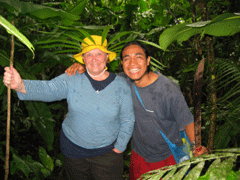Oil on Trial
Air Date: Week of May 29, 2009

Dinah Sheldon tours the Ecuadorian jungles with a local guide.
The world’s biggest oil companies are facing allegations of crimes ranging from failing to clean up spills all the way to murder. George Washington University’s International Law Professor Dinah Shelton walks host Steve Curwood through three landmark cases from Nigeria, Ecuador and Indonesia.
Transcript
GELLERMAN: It’s Living on Earth, I’m Bruce Gellerman.
CURWOOD: And I’m Steve Curwood.
Three of the world’s biggest oil companies are currently battling environmental human rights lawsuits. The Exxon Mobil case involves Indonesia. The Chevron/Texaco suit is in Ecuador. And the Shell case involves Nigeria. That case is about to go on trial in a New York federal court.
The relatives of author Ken Saro-Wiwa and other activists allege Shell conspired with the Nigerian government to falsely accuse and execute Saro-Wiwa and eight of his colleagues.
Dinah Shelton is a Professor of International Law at the George Washington University and joins us now. Welcome.
SHELTON: Thank you very much. Pleasure to be here.
CURWOOD: Professor Shelton, what’s Shell’s defense to charges of collusion with the Nigerian government?
SHELTON: Well, Shell is saying that they had no deal, that they were simply conducting their own activities, they were not responsible for what the government did and that they had asked the government to grant clemency to Saro-Wiwa. And the family says that they can prove that Shell’s Nigerian subsidiary director met with Saro-Wiwa’s brother and offered freedom in return to an end to the opposition to Shell’s activities. So all of this is evidence that will have to be litigated in the trial.
CURWOOD: Why are they trying this case in New York?
SHELTON: Well they’re trying it in New York because, of course, Shell is in New York, and the very first United States Congress in 1789 passed a statute allowing aliens to come to the United States and sue defendants found here for violations of treaties to which the U.S. is a party or violations of international law more generally.

Dinah Shelton tours the Ecuadorian jungles with a local guide.
CURWOOD: Now there are other substantial oil lawsuits that are going on right now. Both Ecuador and Indonesia have some large cases in the works. Chevron is being sued for 27 billion dollars for polluting the jungle. I gather that case has actually left the United States and is in Ecuador now.
SHELTON: So, the case spent about fourteen years in U.S. courts with first Texaco and later Chevron arguing that it should be in the Ecuadorian courts and now they’re trying to argue their way out of the Ecuadorian courts so. There doesn’t seem to be a forum they really like.
CURWOOD: Why do they say that they shouldn’t be in court in Ecuador if that’s what they argued before?
SHELTON: Well, the government has changed. Originally when the case was filed in New York, the President of Ecuador came in and sought to have the case dismissed saying that this would be very harmful to Ecuadorian interests. The government has since changed. The government now is more concerned with environmental protection. One of the reasons why these cases often end up in U.S. courts is that the domestic courts in the foreign countries are not always strong institutions and the judges may follow the prevailing political opinion within the country.
CURWOOD: You’ve spent some time in Ecuador and seen some of the polluted areas. How bad is it?
SHELTON: Well the pollution isn’t always visible because it’s primarily in the water system. But you do see as you go along areas where the oil company activities have occurred that there is a sheen on the water, the water looks like oil. It doesn’t look like pure water. And this is an area, a rain forest, where there are inundations on a daily basis and yet, it is not enough to sweep away the oil.

Dinah Shelton is a professor of International Law at George Washington University Law School.
CURWOOD: Now in Indonesia Exxon Mobile is being sued by some villagers in Ache for human rights violations allegedly committed by soldiers guarding a natural gas plant. What exactly are the allegations in that case?
SHELTON: They’re very similar in many ways to the Ken Saro-Wiwa case. That, in this instance, the company was directly hiring the military to protect their interests there with the result that there were what in other countries might be called ethnic cleansing, that there have been killings, there have been burnings of villages. It’s very similar to the Nigerian case in respect of the type of violence and abuses that are alleged.
CURWOOD: What does it mean that all this is happening now? What kind of signal is it that we may be at some new level of accountability for international companies?
SHELTON: Well, I think that it really is a break from traditional human rights law, which focused on strong, repressive governments. The whole paradigm of human rights violations was Hitler, and human rights law was designed to prevents types of massive human rights violations from occurring again through strong governments. In all three of the cases that you mentioned and many of the other corporate responsibility cases, there are very good laws in place in the states where these companies are acting, but those laws are not enforced, the institutions are weak, the policing is weak, there may be rampant corruption as there was in Nigeria under the Abacha government. And the consequence is that individuals are finding themselves victims of violations by a conspiracy, if you will, or a joint venture between governments and powerful multinational companies.
CURWOOD: You recently testified in front of Congress about these cases, and I know at one point you were asked why we should care, why the United States and the Congress should care about the abuses that are alleged in these cases. What was your answer?
SHELTON: Well my answer is that when companies are linked to abusive regimes, they’re engaged in murder, they’re engaged in destructions of property and whole entire cultures, it reflects back on the United States. So that’s one reason. A second reason is because people who’s rights are violated, who are no longer able to live in their own environment because it has been destroyed are going to move elsewhere. And we are going to see more and more environmental refugees as well as human rights refugees if this conduct continues. Thirdly, in the long run, the corporations are going to find themselves in enormous difficulty because the people turn to violence, and the corporations have seen hostages being taken, they’ve seen violence directed against them. So it’s in their interest as well. Not to mention the fact that – it’s the law.
CURWOOD: Diana Shelton is a professor or International Law at the George Washington University Law School. Thank you so much.
SHELTON: You’re welcome. Thank you for inviting me.
Links
Click here for the transcript of the Congressional hearing on human rights.
Living on Earth wants to hear from you!
Living on Earth
62 Calef Highway, Suite 212
Lee, NH 03861
Telephone: 617-287-4121
E-mail: comments@loe.org
Newsletter [Click here]
Donate to Living on Earth!
Living on Earth is an independent media program and relies entirely on contributions from listeners and institutions supporting public service. Please donate now to preserve an independent environmental voice.
NewsletterLiving on Earth offers a weekly delivery of the show's rundown to your mailbox. Sign up for our newsletter today!
 Sailors For The Sea: Be the change you want to sea.
Sailors For The Sea: Be the change you want to sea.
 The Grantham Foundation for the Protection of the Environment: Committed to protecting and improving the health of the global environment.
The Grantham Foundation for the Protection of the Environment: Committed to protecting and improving the health of the global environment.
 Contribute to Living on Earth and receive, as our gift to you, an archival print of one of Mark Seth Lender's extraordinary wildlife photographs. Follow the link to see Mark's current collection of photographs.
Contribute to Living on Earth and receive, as our gift to you, an archival print of one of Mark Seth Lender's extraordinary wildlife photographs. Follow the link to see Mark's current collection of photographs.
 Buy a signed copy of Mark Seth Lender's book Smeagull the Seagull & support Living on Earth
Buy a signed copy of Mark Seth Lender's book Smeagull the Seagull & support Living on Earth

